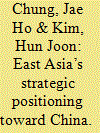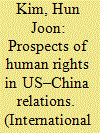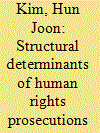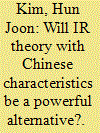|
|
|
Sort Order |
|
|
|
Items / Page
|
|
|
|
|
|
|
| Srl | Item |
| 1 |
ID:
131507


|
|
|
|
|
| Publication |
2014.
|
| Summary/Abstract |
Two parallel norms mandate an international duty to hold state leaders individually accountable for serious corruption and human rights crimes. The development of these new norms is poorly explained by realist and neoliberal perspectives, but there are also weaknesses in recent constructivist explanations of norm diffusion that emphasize agency at the expense of structure. Such approaches have difficulty explaining the source of and similarities between new norms, and treat norm entrepreneurs as prior to and separate from their environment. In contrast, drawing on sociological institutionalism, we present a more structural explanation of individual accountability norms. The norms derive from an overarching modernist world culture privileging individual rights and responsibilities, as well as rational-legal authority. This culture is more generative of norm entrepreneurs than generated by them. The specific norms are instantiated through a process of "theorization" within permissive post-Cold War conditions, and diffused via mimicry, professionalization, and coercive isomorphism
|
|
|
|
|
|
|
|
|
|
|
|
|
|
|
|
| 2 |
ID:
192074


|
|
|
|
|
| Summary/Abstract |
Relatively few systematic and categorical studies have been conducted on the variant responses by East Asian states to the rise of China, and even fewer dealt with reasons for such intra-regional variations. This study seeks to fill the void by examining the strategic responses by 15 East Asian states for the period of 2011–2016. This period merits close scrutiny because China became more explicitly assertive. The research proceeds in two phases. First, by way of reading into the expert assessments in academic journals, the strategic responses of the 15 states are categorised into balancing, hedging, or bandwagoning. Second, statistical analyses are conducted to see how the intra-regional variations are related to unit-level factors. Of the seven variables analyzed, three – geographical proximity, democracy, and identity – turn out to be crucial in determining the East Asian states’ strategic responses.
|
|
|
|
|
|
|
|
|
|
|
|
|
|
|
|
| 3 |
ID:
188664


|
|
|
|
|
| Summary/Abstract |
What are the prospects of U.S.-China relations in the area of human rights? Skeptics maintain that human rights is no longer an issue between the United States and China. A traditional understanding of U.S.–China relations ignores the role of norms, while the constructivist perspective recognizes their independent effects. This paper links the traditional understanding of power politics between the United States and China with the study of constructivist norm research. The three findings of constructivist norm theories are relevant and applied to predict the status of human rights in U.S.-China relations: the historical construction of norms, the long-term and multifaceted effects of norms, and the persistence of norms. Based on these theoretical predictions, it is expected that, although convergence is not completely impossible, the past dynamic of competition and confrontation will continue and human rights will still be a contentious issue in U.S.-China relations.
|
|
|
|
|
|
|
|
|
|
|
|
|
|
|
|
| 4 |
ID:
112778


|
|
|
|
|
| Publication |
2012.
|
| Summary/Abstract |
Over the last three decades, a growing number of countries have experienced a transition from authoritarianism to democracy, and the new governments have been increasingly expected to address past human rights violations. While the academic literature on the impact of human rights prosecution is relatively well developed, the literature on the causes of such prosecution is still sparse. Why do states pursue criminal prosecutions against former state officials on the charge of human rights violations? This article answers this question by testing three key theories: the balance of power between old and new elites, transnational advocacy networks, and the diffusion theory. I conduct a cross-national study of 71 countries that were in a state of democratic transitions between 1980 and 2006, using a new dataset on domestic human rights prosecutions. I find strong evidence to support the transnational advocacy networks and diffusion explanations. First, active domestic and international human rights advocacy for individual criminal accountability is a key factor guaranteeing persistent and frequent human rights prosecutions. My study further shows that domestic advocacy plays a crucial role in criminal prosecutions of high-profile state officials while international pressure is more effective in promoting prosecutions of low-profile officials. Second, the diffusion theory is also supported since the occurrence of human rights prosecution in neighboring countries is a relevant factor. Interestingly, transitional countries are most sensitive to trials occurring in culturally or linguistically similar countries and this supports the constructivist norm diffusion theory, which focuses on the role of identity and communication in the diffusion process. However, I find that the power balance explanation, which has been the prevailing explanation, is valid only for the immediate use of human rights prosecutions.
|
|
|
|
|
|
|
|
|
|
|
|
|
|
|
|
| 5 |
ID:
145192


|
|
|
|
|
| Summary/Abstract |
The study of International Relations in China has dramatically increased over the past 30 years. Scholars have now developed a Chinese School(s) of International Relations theory, or at least, International Relations theory with ‘Chinese characteristics’. This recent Chinese move is neither new nor the first attempt, but located within larger efforts to move away from Anglo-Saxon dominance within the International Relations discipline by localizing International Relations theory. From this standpoint, although there seem to be more problems than promises in recent Chinese attempts, we still cannot ignore the great potential of this initiative, first because the pace of change is so fast, second because the number of scholars working on the topic is ever increasing, and last, because the rise of China brings more frequent interactions between Chinese and Western International Relations scholars. All these factors provide extremely fertile ground for any lucky, timely seed of Chinese International Relations theory to germinate, flourish, and proliferate.
|
|
|
|
|
|
|
|
|
|
|
|
|
|
|
|
|
|
|
|
|